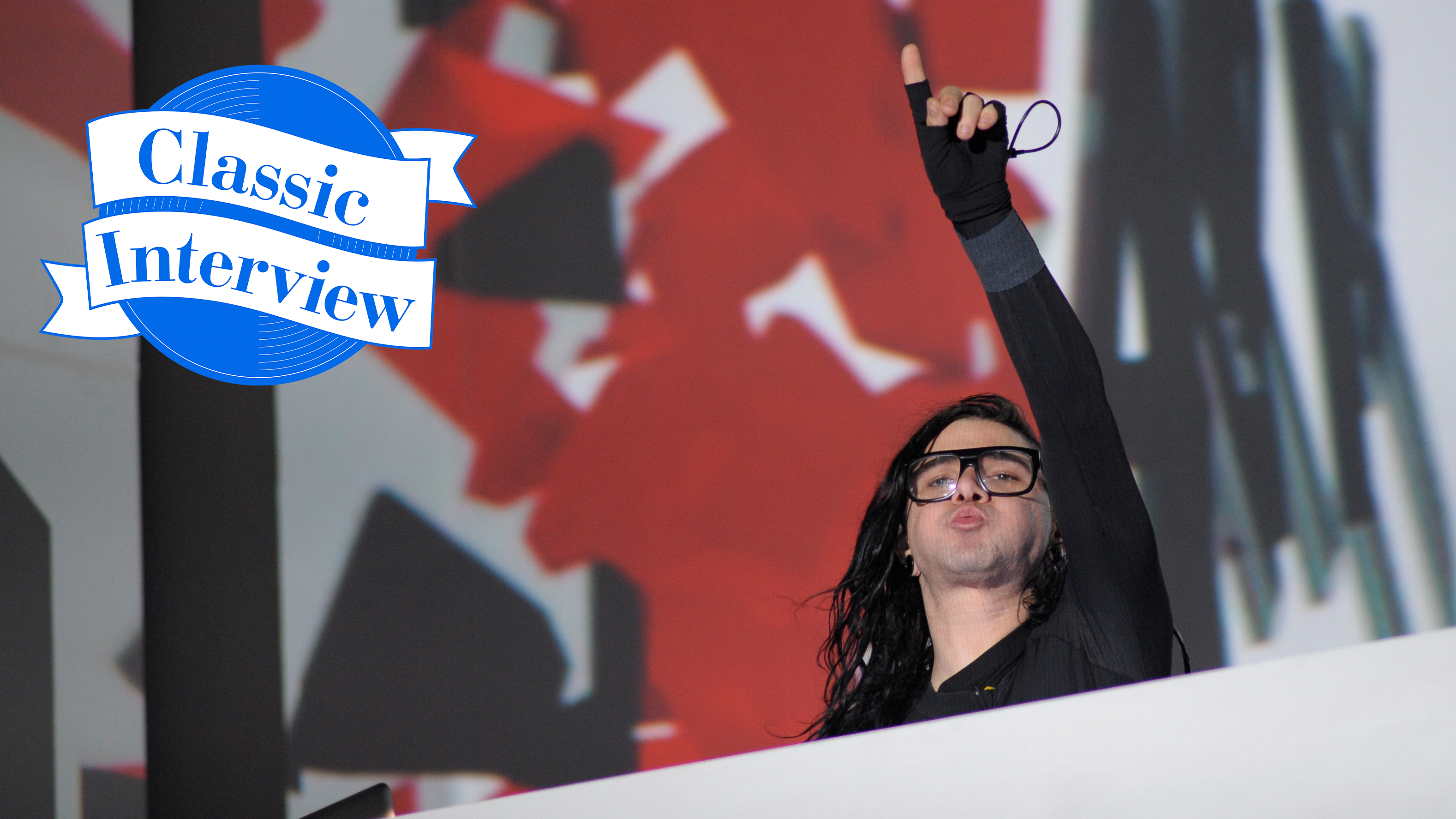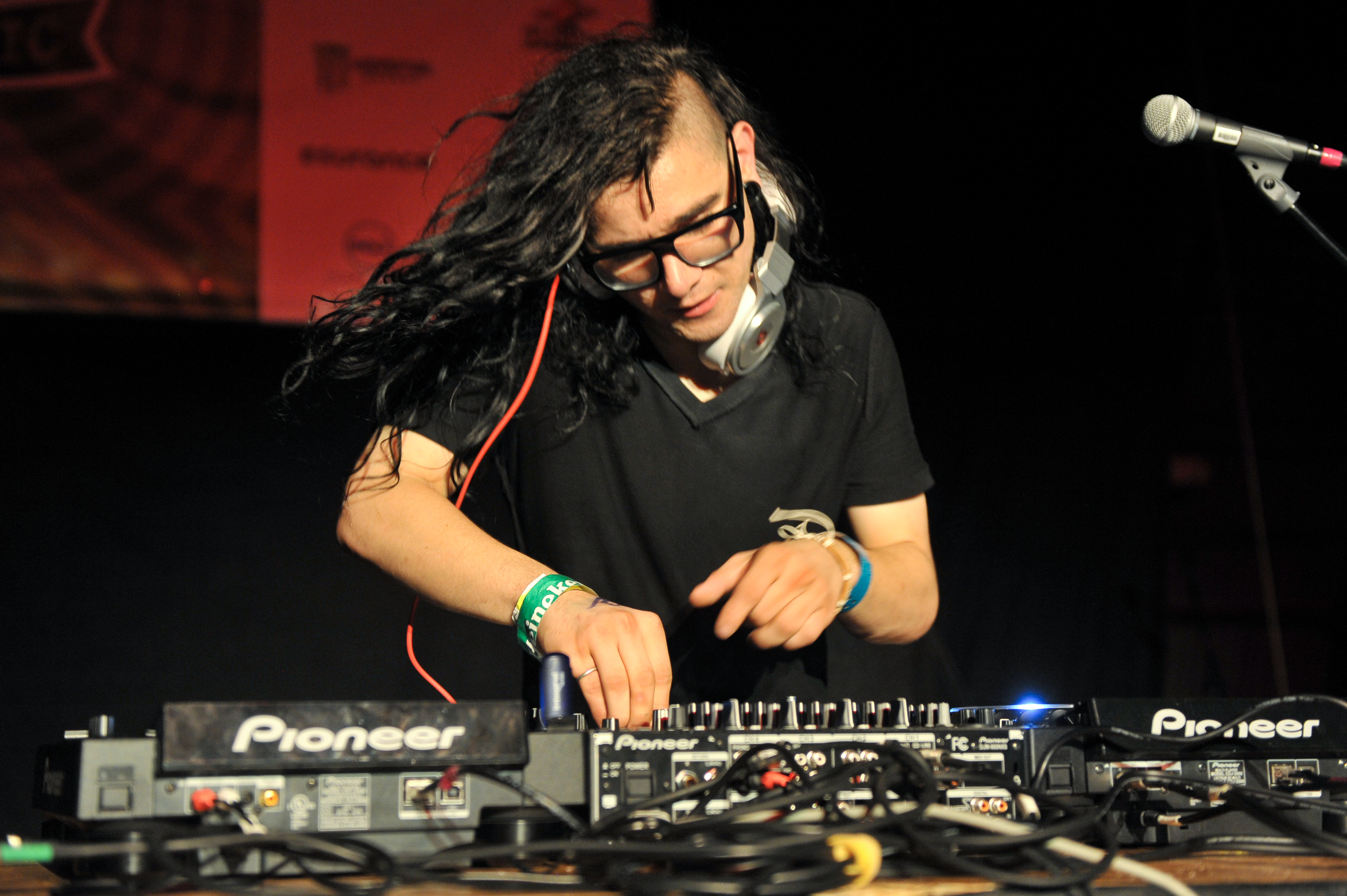Classic interview: Skrillex - "When I did the More Monsters and Sprites EP, I did it all so quickly that I actually did the whole thing with the right speaker blown!"
Following the release of his hotly anticipated double album, we revisit our 2012 interview with one of the world's biggest producers

This month, Skrillex dropped not one but two new albums: Quest For Fire and Don't Get Too Close.
His first full-length releases since 2014's Recess, the feature-packed projects see the EDM poster child turned electro-pop maven enlisting everyone from Four Tet and Fred Again to Missy Elliott and Justin Bieber for a hard-hitting, stylistically diverse set of bangers that confirm his status as one of the world's most talented producers.
In recognition of the release, we're revisiting our 2012 interview with Skrillex, which you can read in full below.
The ubiquitous Skrillex - Sonny Moore on his birth certificate - is possibly electronic music's hardest working artist/producer, with a relentless touring schedule and a speaker-bursting editing and production technique. Recent EPs Bangarang and More Monsters and Sprites only served to cement his reputation as a sound-mangler of the highest calibre.
Over the past 18 months, he's served as one of the most recognisable poster boys of electronic music's rapid rise in the US. It's not just his countrymen and women who have taken to the sound though - he's been playing to sell-out crowds in huge venues across the world.
With a recent project involving the surviving members of The Doors under his belt, three Grammy awards resting on his mantlepiece and plenty of other high-profile collaborations and epic live shows on the way, you can't help but be impressed with what the 24-year-old has achieved so far in his short career.
We caught up with him on perpetual tour in the States to find out about his live show, his production on the road and his hectic schedule.
Get the MusicRadar Newsletter
Want all the hottest music and gear news, reviews, deals, features and more, direct to your inbox? Sign up here.
"I love Ableton Live but I use a ton of other plug-ins and soft synths along with it."
You seem to be permanently on tour. How's that going and do you use the tour to let tracks change and evolve?
"It's going really cool... the last EP [Bangarang] is killing it and I've got a bunch of unreleased bits and pieces that I'm playing out that seem to be going down really well. I'm always on tour so I'm always trying new tracks out live before they're released. That's more necessity than anything, because I don't get a proper chance to sit in a studio and work on tracks like other producers do.
"I was only home for about four days in the second half of last year... And one of those was a show day when I was just hanging out."
So you must have a little studio set up on the road with you at all times?
"Yeah... I've got a MacBook Pro running Ableton Live with two little KRK monitors and a Focusrite Saffire Pro 14 interface. I've got a little two-octave Alesis controller, which I never even seem to use because I end up drawing everything in with the mouse. I've got a guitar too. I love Ableton Live but I use a ton of other plug-ins and soft synths along with it. I started with Fruity Loops back in the day, then Reason and then I learnt Pro Tools but I kinda hated it so I got Ableton Live, which is just so incredibly intuitive."
Have you had a look at Fruity Loops recently? With the beefed-up FL Studio?
"Fruity Loops is an amazing bit of software but I'm Mac-based now so I can't run it. I started out running some PC I got for Christmas but I'm a Mac guy now... Otherwise I'd love to be able to jam with FL Studio.
"I know in Europe there are still a lot of PC users, which is cool as there's some great third-party software. When I was working with Noisia in their studio they had a ton of crazy plug-ins that I'd never even seen before. You can get some crazy freeware shit for PC too, which you can miss out on with OS X."
"If you saw how I work, I think it's definitely quite unconventional just because it's all self-taught"
Has your gear setup changed much from your Kill Everybody days?
"Not really, no. Mainly because I've never had a chance to sit down and find out how I'd like it to change. I was never really a DJ... I just kinda figured it all out at once as I started to tour. I was making music and producing and I just had to start to DJ as I got more into touring.
"I'm still trying to figure out what being a producer/DJ really means to be honest... But it's kinda working out though and I'm happy and excited by it."
And you have a tour schedule that might finish off lesser mortals...
"Dude, you have no idea! Sometimes it's the flying schedule that can really fuck you up. I've played at festivals in Budapest, slept for an hour at the hotel then got up to fly toSouth Texas the next morning to sound-check at another festival. It can be really crazy. I seem to spend a minimum of eight hours a day in transit of some sort or another... that's eight hours of your life gone. People always ask if I suffer from jet lag but it's kinda become really normal for me... Although the jet lag does become a factor and you're pretty much always tired."
Those KRK monitors of yours must endure some serious punishment?
"Yeah... [laughs] When I did the last EP [More Monsters And Sprites] I did it all so quickly that I actually did the whole thing with the right speaker blown! I'm pretty happy with my sonics though so, if it does ever cause any grief live it's a good grief, for sure."

You're famed for your ferocious editing skills - are those all self-taught?
"Pretty much all self-taught, man. Back when I was using Pro Tools I had a friend kind of mentoring me in the very basics of mixing, compression and EQ. He was a rock producer though, so it was definitely a lot different from the sonic direction I try to head in now.
"If you saw how I work, I think it's definitely quite unconventional just because it's all self-taught - I didn't learn conventional production methods. I'm kinda stubborn in some ways too in that, at one point, what I do would definitely not be considered 'production', it would just be considered noise, which is so wrong.
"I like the fact that I do things in very minimal, unconventional ways and that I can carefully craft records on laptops - and blown speakers!"
Care to impart any editing tips or tricks to the readers?
"You know what, I work really fast and I've come to realise that the reason for that might be because I don't use a mouse - I just use the trackpad. It feels a bit like Minority Report when I'm touching and sliding everything [laughs]. Other than that, for editing it all depends on what you want to do on each track. On some tracks, everything is audio by the end of a mix-down whereas on others I have live synths MIDI-triggering whatever soft synths I'm using, with automating parameters going wild all the time. So, as far as actual editing tips go, I'm not sure, really.
"At the end of the day it's not so much the editing style that matters, it's more about having a real cool, concrete idea. Even if it's a whole line of bits and crazy parts, it still has to stick with you and have... almost like a phrase."
Is your modus operandi set in stone now or is it something that can change depending on how you feel at any given time?
"It's usually about how I'm feeling at the time... I'll never abandon what I've done before but I want to keep growing. I'm always creating new synth sounds and samples when I work, which often take me off in a certain direction, but it's always about who I am."
"You open up an oscillator, fuck with the wavetable and for some people that can be your sound."
How do you go about choosing what software and plug-ins you use?
"A lot of it is word of mouth... I knew Noisia were using NI's FM8 and as they're such brilliant producers, that made me want to try using it too. Word of mouth works because I'm always moving so fast that it's hard to sit down and completely learn something new. Native Instruments are pretty standard, and for good reason - Massive, Reaktor and FM8 are all amazing.
"If there's one company that can do it all then it might be Native Instruments. Massive and wavetable synthesis is more plug-and-play... you open up an oscillator, fuck with the wavetable and for some people that can be your sound. FM synthesis though, especially from scratch, is so elemental and fun to build sounds with."
How do you bounce back from having your laptop and hard drives - with an entire unreleased album on them - stolen a year back?
"You never bounce back from that, man. It wasn't just my album it was four years' worth of all my other work too. There's not a night that passes when that doesn't still sting. You move forward and you make new records but I've honestly never been more devastated."
How do you create those brilliantly mashed-up vocals that you use?
"I do most of my vocals - aside from a couple of little one-shot vocal samples. I record everything into the Saffire with an SM58 then scratch it with loads of plug-ins. I don't do much vocoding to be honest. All my vocals are usually done with Melodyne and a ton of other plug-ins to make it sound weird. I've used vocoders with guitar notes and fucked up all the formants, which is pretty cool, but I don't tend to use them for vocals."


Future Music is the number one magazine for today's producers. Packed with technique and technology we'll help you make great new music. All-access artist interviews, in-depth gear reviews, essential production tutorials and much more. Every marvellous monthly edition features reliable reviews of the latest and greatest hardware and software technology and techniques, unparalleled advice, in-depth interviews, sensational free samples and so much more to improve the experience and outcome of your music-making.
“I’m looking forward to breaking it in on stage”: Mustard will be headlining at Coachella tonight with a very exclusive Native Instruments Maschine MK3, and there’s custom yellow Kontrol S49 MIDI keyboard, too
“Turns out they weigh more than I thought... #tornthisway”: Mark Ronson injures himself trying to move a stage monitor










